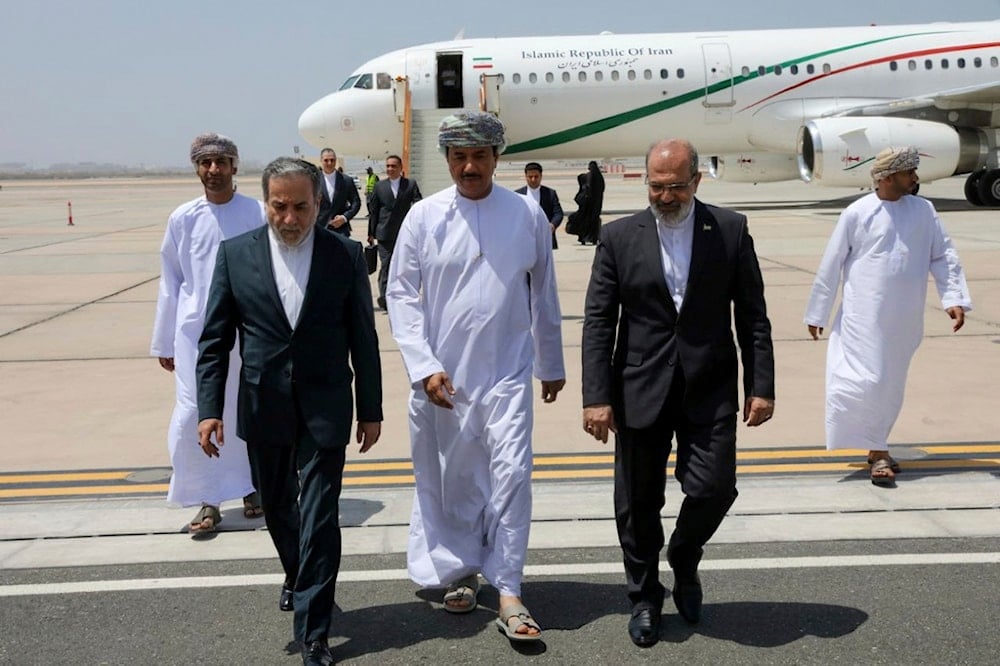Iran-US nuclear talks show progress, more rounds expected
Iran and the US concluded a difficult but productive round of nuclear talks in Oman, with both sides agreeing to continue technical negotiations soon.
-

In this photo released by the Iranian Foreign Ministry, Iranian Foreign Minister Abbas Araghchi, left, is welcomed upon his arrival at Muscat, Oman, for negotiations with US Mideast envoy Steve Witkoff, Sunday, May 11, 2025. (AP)
Iran’s Foreign Ministry confirmed Sunday that the fourth round of indirect negotiations with the United States over Tehran’s nuclear program concluded in Muscat, Oman, describing the discussions as “difficult but useful.”
Foreign Ministry spokesperson Esmail Baqaei stated on X that the round helped both sides “better understand each other’s positions” and explore “reasonable and realistic ways to address the differences.” He noted that the next session will be announced and coordinated by the Omani mediators.
A senior US official also characterized the latest round of talks positively, saying further negotiations would take place soon. The official, speaking on condition of anonymity, said the discussions, led by US special envoy Steve Witkoff, “were again both direct and indirect, and lasted over 3 hours.”
The two sides, the official added, agreed to move forward in addressing technical elements, stating, “We are encouraged by today's outcome and look forward to our next meeting, which will happen in the near future.”
Iran, US resume talks
Since April 12, Tehran and Washington have engaged in three rounds of dialogue, the most significant contact on the nuclear issue since Trump’s 2018 withdrawal from the Joint Comprehensive Plan of Action (JCPOA).
These recent talks were initiated after Trump sent a letter to Iran’s Leader, Sayyed Ali Khamenei, in March, calling for renewed discussions while simultaneously warning of potential military action if diplomacy did not succeed.
The tension surrounding Iran’s nuclear program has intensified since the US exit from the JCPOA, which had provided Tehran with sanctions relief in exchange for limiting its nuclear activities.
Iran remained in compliance for a year following the withdrawal but gradually began scaling back its commitments. Western governments have accused Iran of attempting to develop nuclear weapons, an allegation Tehran firmly rejects. Iran has confirmed over and over again that the country’s nuclear program is strictly for peaceful, civilian purposes.
Iran hopes to make progress
Iranian Foreign Minister Abbas Araghchi stated Sunday that Iran remains firmly committed to its principled positions ahead of the fourth round of indirect Iran-US nuclear talks.
"Following my recent trip to the region and consultations with Saudi Arabia and Qatar, I am now heading to Oman. We had additional consultations this morning in Tehran, and we hope to reach a determining point in this round," he said.
The top Iranian diplomat criticized Washington for what he described as inconsistencies in its statements and behavior.
"Unfortunately, we hear many contradictory statements from the other side. There are inconsistencies in both their interviews and the positions they adopt. Their stance during negotiations differs from what they express outside the talks, and this is one of the key problems in the negotiation process," Araghchi pointed out.
"In contrast to the other party," Araghchi added, "the Islamic Republic of Iran has well-known positions grounded in principles. We have moved along a straight path, and our positions are entirely clear."

 3 Min Read
3 Min Read










